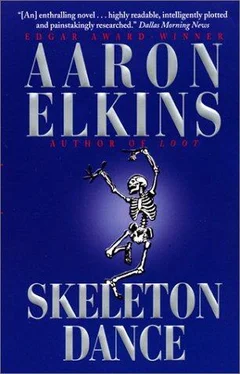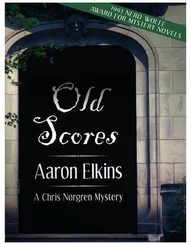Aaron Elkins - Skeleton dance
Здесь есть возможность читать онлайн «Aaron Elkins - Skeleton dance» весь текст электронной книги совершенно бесплатно (целиком полную версию без сокращений). В некоторых случаях можно слушать аудио, скачать через торрент в формате fb2 и присутствует краткое содержание. Жанр: Классический детектив, на английском языке. Описание произведения, (предисловие) а так же отзывы посетителей доступны на портале библиотеки ЛибКат.
- Название:Skeleton dance
- Автор:
- Жанр:
- Год:неизвестен
- ISBN:нет данных
- Рейтинг книги:5 / 5. Голосов: 1
-
Избранное:Добавить в избранное
- Отзывы:
-
Ваша оценка:
- 100
- 1
- 2
- 3
- 4
- 5
Skeleton dance: краткое содержание, описание и аннотация
Предлагаем к чтению аннотацию, описание, краткое содержание или предисловие (зависит от того, что написал сам автор книги «Skeleton dance»). Если вы не нашли необходимую информацию о книге — напишите в комментариях, мы постараемся отыскать её.
Skeleton dance — читать онлайн бесплатно полную книгу (весь текст) целиком
Ниже представлен текст книги, разбитый по страницам. Система сохранения места последней прочитанной страницы, позволяет с удобством читать онлайн бесплатно книгу «Skeleton dance», без необходимости каждый раз заново искать на чём Вы остановились. Поставьте закладку, и сможете в любой момент перейти на страницу, на которой закончили чтение.
Интервал:
Закладка:
"But you are." Gideon leaned earnestly toward him. "Professor Montfort, in my view the whole structure of anthropology-of any science-depends on the moral integrity of individual scientists who put the extension of knowledge ahead of any personal stake, however great, in the outcome of research. And you did that."
Gideon's forehead was suddenly warm. What he'd said had come across as painfully stuffy and pretentious, even to him, but it had come from the heart; Montfort was the hero of the story. Decades earlier, he had been one of the first to propound the idea of the essential humanity of the Neanderthals-their sensitivity, their intelligence, their cultural development. He had written eloquently and spoken-less eloquently but just as fervently-on the subject for two decades, presenting papers at one conference after another, eventually becoming its acknowledged spokesman. Ely Carpenter, taking up archaeology late in life, had been his student, a protege-although younger by only a few years-who whole-heartedly embraced his views and in whose subsequent success his mentor had taken enormous pride.
When Carpenter, by that time the director of the institute, had come up with those four perforated bones, Montfort had been ecstatic too. He had trumpeted the find as the long-hoped-for confirmation of his own theories and had stood shoulder to shoulder with Carpenter, zestfully fending off the doubters and the attackers.
But when evidence began mounting that the bones had actually been pilfered from a nearby museum, then doctored and 'planted' in the Tayac abri, the scholarly abuse (and scholars were in a class of their own when it came to abuse) rained down on Carpenter, on Montfort, and even on the blameless institute. It must have felt to Montfort as if his life's work had been made ludicrous, and yet, in the best tradition of science, he had calmly, objectively re-examined the now-discredited bones on his own and had eventually published the definitive paper, a landmark piece of scientific detective work showing exactly how the bones had been treated to make them look authentic. He had stoutly continued to maintain that Carpenter was the victim, not the perpetrator, but at the same time he had unshrinkingly established for good and all that he and his protege had been in the wrong, gullible dupes at best; his enemies had been right all the while. And that, as far as Gideon was concerned, was enough to make him a hero.
"Permit me to offer a small but significant semantic correction, Gideon," Emile said into the silence. "I submit that what you're describing is nothing more than simple scholarly disinterestedness-commendable, certainly, but hardly heroic. Now, speaking as a-"
Trained paleopathologist, Gideon thought.
"-trained scientist," Emile said, "I have to assume that disinterestedness is the foundation on which we-that is, all of us who call ourselves scientists-guide all of our actions. To accord it 'heroic' status is to make the error of implying that it is singular rather than customary and expected. I mean no disrespect, Michel."
But Montfort had been visibly moved by Gideon's speech. He slowly massaged his forehead, one hand at each temple, and grunted something about the desirability of leaving sleeping dogs to themselves, but said that if Gideon cared to interview him about Tayac he would make himself available. That turned the tide. There was a little grumbling, but in the end, much to Gideon's relief, everyone came around and agreed to talk to him.
Once the schedule was settled, the subject turned immediately and surprisingly to the new skeleton from the abri. They had been following the story all week, they said. It had been well-covered from the start in Sud Ouest, the local newspaper, and even more so when Inspector Joly was brought in, and this morning there had been an interview with Prefect of Police Marielle in which Gideon was mentioned by name. Questions flew: Did he know whose body it was? Was it true that the individual had been shot, murdered? Had he completed his analysis? Could he tell how long the body had been there? Did the police have a suspect? Was No, he said, he didn't know whose body it was; and yes, he had been shot to death; and no, his analysis wasn't complete, he'd be going to the St.-Cyprien morgue that afternoon to clean the bones and examine them further; and yes-He paused. "Wait, hold it, why is everyone so interested in this?"
"And why wouldn't we be interested?" Beaupierre asked; the first time he'd been heard from since introducing Gideon. "A murdered man found in one of our own rockshelters."
"Your own-? I don't-you mean those were your test trenches?"
"Certainly," Beaupierre said, laughing. "I dug them myself. They were sunk more than thirty years ago, one of the institute's early endeavors. You'll find the site in the archaeological record as PN-119. Unfortunately, it held nothing of interest."
Maybe not, Gideon thought, but the coincidences-the kind of coincidences that Joly liked so much-were beginning to pile up. First it turns out that the murdered man might have been a former institute employee, and now it seems that the body was buried in an old institute site. And what about that trowel, don't forget about that.
There was something going on behind the scenes here, but what?
"Unless, of course," Pru said to the director, "you accidentally overlooked a body buried in the middle of the floor."
But the unswervingly literal-minded Jacques Beaupierre was the wrong man for such banter. Confounded, he stared at her. "Are you joking?"
"Yes, Jacques."
Beaupierre didn't get it. "I'm sure I would never have overlooked such a thing."
"You didn't overlook anything, Jacques," Gideon assured him. "He wasn't buried there until much later, in the backfill from the trenches. He's only been there three years or so."
There was a sudden shift in mood around him, nothing so obvious as darting eyes or pregnant glances, but a sort of ripple, a fraction of a second that was out of kilter, as if a movie film had skittered over a torn sprocket hole. The discontinuity wasn't lost on Gideon, but what did it mean? Three years ago-that was when the commotion over the Old Man of Tayac had erupted. Was there a connection there?
Pru cleared her throat. "We had no idea it was so recent."
"The newspaper implied it'd been there for decades," Audrey said.
Gideon shook his head. "No, nowhere near that. Right around three years, that's all." Well, two to five, to be honest, but he'd clearly struck a chord of some kind with three, and if ever there was a time to do what Joly had asked him to, this was it. "You know, I was talking to the inspector this morning, and he wanted me to check something with you. He seems to think he might know who those bones belonged to: a man by the name of Jean Bousquet. I understand he worked here."
It was Audrey who answered after a barely perceptible general pause. "Bousquet? Yes, he was a temporary laborer, a hard man to get along with. It was a mistake to hire him-I don't think anyone here would argue with that-but temporary help isn't easy to find. It's hard, dirty work; they have to dig on their knees, or even on their bellies, half the time."
Pru laughed. "What, and we don't?"
"…really be Bousquet?" Beaupierre mumbled, coming in from his private wavelength. "But I don't see how, ah, mm…" And off he went again.
This time Gideon stayed with him. "You don't see what, Jacques?"
Beaupierre absently ran his fingers over his scalp, assuring himself that the few dozen heavily sprayed strands of hair that he combed over the top were still in place. "Well, only that it would mean that he must have returned from Corsica afterwards, and why would he-"
"From Corsica?" Gideon exclaimed. "He went to Corsica? Do you mean, after he disappeared from here?"
Читать дальшеИнтервал:
Закладка:
Похожие книги на «Skeleton dance»
Представляем Вашему вниманию похожие книги на «Skeleton dance» списком для выбора. Мы отобрали схожую по названию и смыслу литературу в надежде предоставить читателям больше вариантов отыскать новые, интересные, ещё непрочитанные произведения.
Обсуждение, отзывы о книге «Skeleton dance» и просто собственные мнения читателей. Оставьте ваши комментарии, напишите, что Вы думаете о произведении, его смысле или главных героях. Укажите что конкретно понравилось, а что нет, и почему Вы так считаете.












